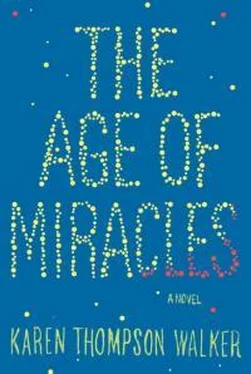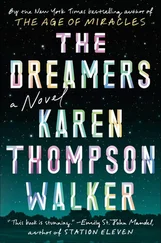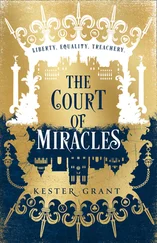“Wait a minute,” said my mother. She waved a jar of peanut butter in my father’s direction. “You opened this?” In her other hand, she held the evidence, the knife. Its sharper side glistened with a coat of extra-crunchy.
My father, at the table, took a giant bite of wheat toast.
“Goddammit, Joel,” she said. “Goddammit. I was saving this.”
I kept my eyes on the bracelet I was weaving and waited for the fight to pass. I focused on the complicated pattern I’d chosen, using Hanna’s favorite colors. There was something calming about the tying of those knots, one after another, the way the design emerged from the tips of my fingers, so orderly and so slow.
My father chewed, swallowed, took a careful sip of coffee.
“Helen,” he said. “We have six jars in there.”
He was against my mother’s hoarding.
“Do you think this is a joke?” she said. “A guy on CNN said we might only have a few weeks left before everything falls apart.”
In her fury, my mother tripped over the blue ceramic water bowl we kept on the floor for the cats. “Shit,” she said. A miniature tide rolled across the tile.
“Until what falls apart?” I asked.
“I haven’t heard anything like that ,” said my father.
My mother’s voice took on a low, serious register: “Well, then, maybe you’re not listening.”
If my father responded, I didn’t hear it. I slipped upstairs. Most likely, he simply returned to the paper.
What went on in that head of his? I would soon come to understand that he gave voice to only a fraction of the thoughts that swam behind his eyes. It was not nearly so clean and smooth in there as it seemed. Other lives were housed in that mind, parallel worlds. Maybe we’re all built a little bit that way. But most of us drop hints. Most of us leave clues. My father was more careful.
When I think now of that moment in the kitchen, an almost unbelievable thought comes to my mind: There was a time when those two people—that man hunched at the table and that woman shouting in a bathrobe—were young. The proof was in the pictures that hung on the living room walls, a pretty girl and a bookish guy, a studio apartment in a crumbling Hollywood building overlooking a courtyard and a kidney-shaped pool. This was the mythical period before I was born, when my mother was not a mother and was instead an actress who might make it someday, any day, maybe soon, a serious girl with a lovely face. How much sweeter life would be if it all happened in reverse, if, after decades of disappointments, you finally arrived at an age when you had conceded nothing, when everything was possible. I like to think about how my parents’ lives once shimmered in front of them, half hidden, like buried gold. Back then the future was whatever they imagined—and they never imagined this.
But doesn’t every previous era feel like fiction once it’s gone? After a while, certain vestigial sayings are all that remain. Decades after the invention of the automobile, for instance, we continue to warn each other not to put the cart before the horse . So, too, we do still have day dreams and night mares, and the early-morning clock hours are still known colloquially (if increasingly mysteriously) as the crack of dawn . Similarly, even as they grew apart, my parents never stopped calling each other sweetheart .
I’ll tell you one thing about that first Sunday on the clock: Time flew. We’d grown quite accustomed to those long, lazy days. But now the morning zoomed. Midday zipped by at an inhumane speed. The hours tumbled quickly after one another, as if sliding downhill—and there were suddenly so few!
My parents avoided each other all afternoon. A muggy quiet settled over the house. On any other Sunday, I would have escaped to Hanna’s.
Instead, I walked over to my old friend Gabby’s. Her house was three houses down from mine, and we’d grown up together, but I hadn’t seen her much lately.
“I think clock time’s gonna be cool,” Gabby said once we were upstairs in her bedroom. She was sitting on her unmade bed, painting a second coat of black polish on her fingernails. She waved the bottle at me, but I shook my head. It was a glossy, grim black. A few drops had landed on the plush cream-colored carpet. “I like going out in the dark,” she said.
Her dyed black hair kept falling into her face. Charcoal eyeliner ringed her eyes. Silver studs shaped like human skulls glinted from her ears. I hardly recognized her anymore.
“I wish I still went to your school,” she said.
“You hated our school,” I said. When she started smoking and skipping classes, her parents had transferred her to a strict Catholic school.
“Yeah, but all the girls at my school are anorexic bitches,” she said.
We used to swim in her pool every summer and eat potato chips on lawn chairs while our ponytails drip-dried on our backs. But now Gabby never wore a swimsuit; she’d gained a lot of weight. She was always in trouble these days. Hanna hadn’t been allowed to come to her house.
“My mom’s afraid we’re all going to die,” I said.
The room smelled like nail-polish remover and vanilla; a fat white candle was burning on the desk. Two pleated plaid skirts, Gabby’s school uniform, hung over the edge of a chair.
“We are going to die,” said Gabby. “Eventually.”
She was playing music I didn’t recognize: The thin crystal voice of a woman, enraged, shot through the room from two big black speakers.
“But she thinks we’re going to die from this,” I said. “And soon.”
Gabby blew on her fingernails and held up one hand for inspection. A can of diet soda popped and fizzed on the rug.
“Do you believe in past lives?” she said.
“I don’t think so.”
She’d draped a crimson scarf over the only lamp, and the room was dim and stuffy. She’d pulled the vertical blinds shut, but stripes of sunlight glowed through the cracks.
“I’m pretty sure I’ve lived past lives,” she said. “I have this feeling that in every one of them, I die young.”
Lately, I’d begun running out of things to say to other kids. I’d stopped knowing how to respond.
“Hey,” she said. “Want a tattoo? I learned how on the Internet.” She pointed to a sewing needle and a tiny jar of black ink laid out beside the candle on the floor like primitive surgical equipment. “You just run a needle through the flame, then scratch your skin in the shape you want and pour ink into the cut.”
Gabby’s house was the same model as ours but reversed. Her bedroom was the same bedroom as mine, the dimensions exactly equal. For twelve years, we’d slept between walls erected by the same construction crews and looked out on the same fading cul-de-sac through identically sized windows. Grown under similar conditions, we had become very different, two specimens of girlhood, now diverging.
“I’m going to do an outline of the sun and moon on my wrist,” she said. “I’ll do one on you, too, if you want.”
The album came to its end. Silence filled the room.
“I don’t think so,” I said. “I should probably go home.”
Maybe it had begun to happen before the slowing, but it was only afterward that I realized it: My friendships were disintegrating. Things were coming apart. It was a rough crossing, the one from childhood to the next life. And as with any other harsh journey, not everything survived.
That night, while the sun continued to shine, my father came home with a telescope.
“It’s for you,” he said as he unpacked it in my bedroom, tissue paper crinkling. “I want you to know more about science.”
The telescope came in a shiny mahogany box, inside of which lay a silver tube and a trio of titanium legs that glittered in the sunlight. The telescope looked expensive. He set it up in my bedroom and pointed it at the still-bright sky. My mother watched him from the doorway, arms crossed. She was often annoyed with my father these days, and it seemed that even this offering—in the encrypted language that traveled between them—was in some way an affront to her.
Читать дальше












